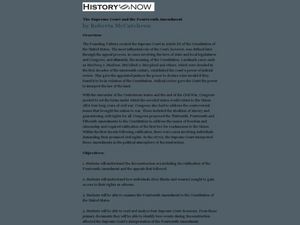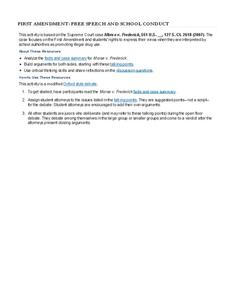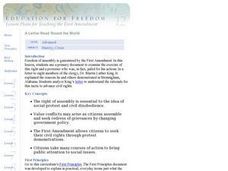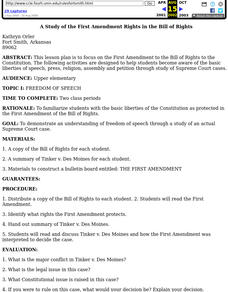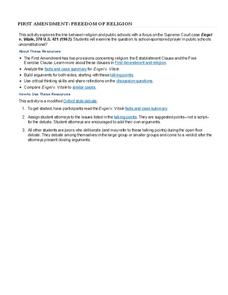State Bar of Texas
Wisconsin v. Yoder
How far does freedom of religion truly go? The 1972 Supreme Court case Wisconsin v. Yoder introduces the concept of the free exercise clause of the First Amendment. Individuals examine the case with a short video and open discussion. To...
Media Smarts
You Be the Editor
Look at different case studies to discuss the ethics of journalism. Twelve real-life events are written up and your learners get to be the editors. Encourage your class to think about the implications of publishing decisions. After each...
Curated OER
The First Amendment, What it Means and When Libel Comes in to Play
Students research three topics: The First Amendment, John Peter Zenger and his trial, and libel. In this journalism and libel lesson, students discuss things authority figures have done they disagree with and the anit-sedition law....
Curated OER
Constitutional Amendments And Gay Marriage
Upper graders critically examine the history and process of amending the U.S. Constitution in light of the current issue facing the courts on legalizing gay marriage. They read a variety of articles, watch news clips, and develop a...
Curated OER
The Bill of Rights: Debating the Amendments
Provide your class with an opportunity to investigate an important historical document. Without identifying the document, distribute copies of the original Bill of Rights, as transcribed by John Beckley, Clerk of the House of...
Curated OER
From Tinker to Fraser: Freedom of Speech in Public Schools
The Tinker and Fraser cases were taken the Supreme Court on the basis of the 1st Amendment right to Freedom of Speech. Learners discuss each case, the First AMendment, complete handouts, and conduct a role play activity. Handouts are...
Curated OER
Does Free Speech Exist in School?
Students examine their own First Amendment rights as students. They read and discuss a news article, discuss the Supreme Court case Frederick v. Morse, take an online quiz and conduct Internet research, and create a brochure outlining...
Curated OER
Law & Ethics for Photojournalists
Students identify and discuss First Amendment rights, examine how to make sound legal judgements regarding photographs of private individuals, examine difference between public and private figures as far as libel law is concerned,...
Curated OER
Freedom of Hate Speech?
Students, using a New York Times article as a springboard for discussion, investigate and debate the complex issues of First Amendments Rights and censorship for Hate Groups using Websites for propaganda.
National Constitution Center
Thirteenth Amendment Poster
President Lincoln believed in the Thirteenth Amendment so strongly that he signed 14 copies of it, but died before he could see it passed on December 18, 1965. Explore the text that forever abolished slavery in America with a document...
Library of Congress
The Emancipation Proclamation and the Thirteenth Amendment
How did the Emancipation Proclamation lead to the Thirteenth Amendment? Middle schoolers analyze primary source documents including the text of the Emancipation Proclamation, political cartoons, photographs, and prints to understand...
Project Tahoe
Does the Use of Torture on Enemy Combatants Violate the 8th Amendment?
Tackle ethics in your high school history classes with a Socratic seminar about torture as a means for obtaining information. The plan allows for pupils to take the reins during the seminar. On the first day, class members read several...
Curated OER
The Supreme Court and the Fourteenth Amendment
Students examine the ratification of the Fourteenth Amendment. In this Reconstruction Era lesson plan, students read and analyze 4 Supreme Court decisions regarding the Fourteenth Amendment and determine how the decisions impacted...
Administrative Office of the US Courts
Morse v. Frederick
If you stop a student from expressing views that advocate drug use, are you violating their right to free speech? Use the 2007 Supreme Court case Morse v. Frederick to discuss a nuanced interpretation of the First Amendment....
Curated OER
The Constitution and the Right to Vote: Ch 6
The US Constitution dictates which members of society have the right to vote. After reading about amendments extending voting rights, your class answers these questions on the 15th, 14th, and 23rd amendments. Use as a quiz or to guide...
Curated OER
A Letter Read 'Round the World
Students examine primary document to examine the concept of free assembly, and analyze Dr. Martin Luther King Jr's letter to the clergy to explain the rationale for this tactic to advance civil rights.
Curated OER
The Bill of Rights - The First Ten Amendments to the Constitution
The Bill of Rights, and the First Ten Ammendments to the Constitution are the focus of this Social Studies presentation. Students view a presentation that nicely presents, not only what each Ammendment says, but examples of how they...
National Woman's History Museum
The Equal Rights Amendment
The debate over the Equal Rights Amendment continues. To better understand the controversy, class members research the history of attempts to get the amendment ratified. In addition, pairs engage in a structured academic conversation...
The New York Times
Where to Draw the Line: Balancing Government Surveillance with the Fourth Amendment
The question of how to balance Fourth Amendment Rights with national security concerns becomes critical in an age of planned terrorist attacks, election interference, and fake news. Get young social scientists involved in the debate with...
Curated OER
A Study of the First Amendment Rights in the Bill of Rights
Students become aware of the basic liberties of speech, press, religion, assembly and petition through study of Supreme Court cases. Student groups analyae some cases heard by the Supreme Court to further their understanding of the First...
Administrative Office of the US Courts
Cox v. New Hampshire
Staging a debate is a great way to class members to think deeply about issues, especially those related to rights guaranteed by the US Constitution. The Supreme Court case, Cox V. New Hampshire, focuses on the First Amendment's...
Newseum
You Can't Say That in School? The Case of Lee v. Weisman
The Supreme Court case Lee v. Weisman is the focus of a lesson that examines religion in public schools. After reading a summary of the case and before reading the verdict, pupils use their knowledge of the First Amendment to discuss the...
Administrative Office of the US Courts
Engel v. Vitale
"Is school-sponsored prayer in public schools unconstitutional?" That is the question teams debate as they consider the arguments presented to the Supreme Court in Engel v. Vitale. The attorneys study the provided talking points and...
Classroom Law Project
What does the Constitution say about voting? Constitutional Amendments and the Electoral College
As part of a study of voting rights in the US, class members examine Constitutional amendments connected with voting and the role of the Electoral College in the election process.














